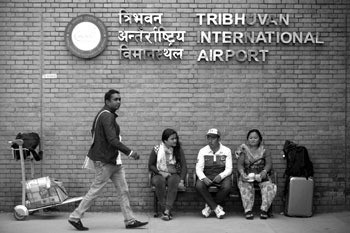
We doubt the zero-cost agreement between Qatar and Nepal this week will come into force because there is too much money to be made on the blood, sweat and tears of Nepali workers by the politically-connected manpower mafia.
For a country that is so dependent on overseas contract workers, the Nepali state seems to be capable of neither protecting its citizens abroad nor maximising the benefits of remittances to the national economy. This is a disgraceful and outrageous lapse, but not surprising given the political disarray and absence of accountability among elected officials.
Eighteen per cent of Nepal’s population of 30 million at any given time is working abroad. Half of them are seasonal migrants in India, and no one keeps any records of where they go after crossing the open border, what jobs they have or how much money they send home. Which is why the national discourse on overseas labour is dominated by the estimated 2 million who are in the Gulf, Malaysia, Korea and Japan.
They send home more than $4 billion a year, and remittances now make up a third of the country’s GDP. Without this safety valve, joblessness among youth would probably have led to even greater political chaos and instability than we have now.
Yet, the shabby way we treat the 2,500 Nepalis leaving for work and returning to Kathmandu airport every day is proof that the worst enemy of Nepali workers are Nepalis themselves. Instead of declaring them national heroes, they are fleeced, cheated, extorted, harassed, and abused by officials, security personnel every step of the way.
Which is why we welcome the zero-fee agreement signed this week between a visiting Qatari delegation led by Labour Minister Abdullah Bin Saleh Mubarak Al-Khulaifi and Nepal’s State Minister for Labour Tek Bahadur Gurung. As Om Astha Rai reports, this is not the first time such an agreement has been signed, so the hope is that this agreement will be enforced strictly.